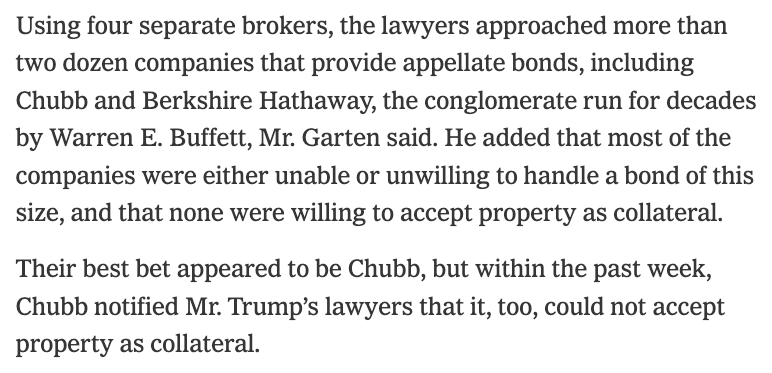-
Posts
15 -
Joined
charlieruane's Achievements
-
Buffett/Berkshire - general news
charlieruane replied to fareastwarriors's topic in Berkshire Hathaway
Fascinating! Mind if I ask where you heard this? -
Buffett/Berkshire - general news
charlieruane replied to fareastwarriors's topic in Berkshire Hathaway
Good point, ha. But TSMC's fragile machinery being almost entirely concentrated on a major fault line does seem like a problem... -
Buffett/Berkshire - general news
charlieruane replied to fareastwarriors's topic in Berkshire Hathaway
Geopolitical risk seemed to be Buffett's primary concern, but he did cite "seismic action" once—though now I realize that was in the following CNBC interview, not at an annual meeting: There’s actually a danger of seismic action, I mean, and where they’re located. But that’s a low probability and they, you know, they’re smart people but would I rather have it, there was a U.S. domicile company than be a subject of who knows what, depending on conditions outside their control? Transcript link. -
Buffett/Berkshire - general news
charlieruane replied to fareastwarriors's topic in Berkshire Hathaway
Big earthquake in Taiwan. Remember when Buffett cited earthquake risk as a reason for backing out of his investment in TSMC? Sounds like TSMC at the very least had to evacuate a bunch of staff, remains to be seen whether this will cause a material delay in production. -
Buffett/Berkshire - general news
charlieruane replied to fareastwarriors's topic in Berkshire Hathaway
@gfp How is shrewdm, generally speaking? Quality material over there? -
Buffett/Berkshire - general news
charlieruane replied to fareastwarriors's topic in Berkshire Hathaway
I enjoyed this Kingswell transcript of an interview Ajit Jain gave in 2011. Jain's closing comment re: his evolving views on philanthropy is particularly interesting, I haven't quite heard this POV before: AM: In terms of charity. AJ: It’s a very difficult question. It’s a very personal question. My views have also sort of changed over time. Without getting into a lot of the details — which aren’t relevant to you and your audience — we have a son that has been diagnosed with a serious illness. Before he was diagnosed with the illness, I always sort of thought much like the Buffett philosophy. I always felt, “Gee, I’ve got this fame, I’ve got this wealth, I didn’t deserve it, and it doesn’t belong to me.” But, after my son’s illness, things did change. I felt I didn’t deserve my son’s illness, either. He didn’t deserve what he’s getting. So, in terms of my giving… Again, without getting into too much detail, two things have changed: One is that we focus on a foundation that is trying to find a cure for his illness. And, secondly, I feel guilty in as much as in the earliest days of his life, while he was healthy, I didn’t let him spend money and have a nice time. So I’ve done a u-turn on that and I spend a lot more money a lot more freely than what I used to. -
What Is the Best Investment That You've Ever Made?
charlieruane replied to blakehampton's topic in General Discussion
I'll chime in on the "best investment" topic, for fun. The boring but correct answer, in risk-adjusted terms, has to be Berkshire over the years. A more fun answer would be the Tech Data (TECD) merger arb trades I made at the beginning of COVID. I rarely see this company discussed so figured it'd be fun to share here. Tech Data is a decades-old distributor of IT components. It's a durable business that shares many of the qualities that make other distributors great (e.g. Fastenal and Sysco). A money manager in my orbit started buying it in the mid 2000s for clients so I've followed and owned it for a while. In 2019, Apollo offered to take the company private for $130/share. To my delight, after BofA contacted Todd Combs, Buffett outbid Apollo and offered $140/share. After Apollo countered with $145/share, Buffett dropped out of the running. By late 2019, TECD was set to go private at $145/share and by January 2020 the stock was trading around $143/share. Then, COVID hit. Forced selling and deal collapses abounded. Though the merger agreement remained intact, TECD traded as low as $97/share on speculation of deal collapse. I figured, hey, this is a business I've tracked for years, it's dominant in its industry, I'd be happy to own it at this price assuming COVID tracks the trajectory of the 1918 flu, it has the Buffett stamp of approval at $140/share pre-COVID, management has expressed a desire to sell (so if this deal falls through another will pop up in time)... So, I bit at ~$102/share in late March, 2020, with about 10% of my investable capital. By June 30th, the deal closed as planned at $145/share, with my blocks returning 38-44% in a little over three months. Pretty fun one! -
charlieruane started following Viking
-
charlieruane started following longterminvestor
-
Buffett/Berkshire - general news
charlieruane replied to fareastwarriors's topic in Berkshire Hathaway
-
One more quick thought on the original topic of this thread, i.e. why many smart investors didn't make a killing off of Berkshire. I think part of it probably stems from a lack of intellectual humility. Berkshire has been the most well-known value investment option for decades now. It takes a certain amount of humility for a money manager to say, "honestly, I'm not likely to beat the risk-adjusted return this investment offers." Managers also have a mandate to "prove their worth" to their clients; it can be hard to justify earning fees on Berkshire even if that is the best choice. It's Buffett's one-foot-hurdles quote manifest...
-
Buffett/Berkshire - general news
charlieruane replied to fareastwarriors's topic in Berkshire Hathaway
And as a followup, here's one of the most bizarre Buffett anecdotes I've encountered, from an Atlantic article on Howard: -
Buffett/Berkshire - general news
charlieruane replied to fareastwarriors's topic in Berkshire Hathaway
Apropos of nothing, a fun fact about Howard Buffett's foundation: according to its latest 990 filing, although Howard receives no standard compensation for his role as Chairman and CEO, he does receive contributions to an employee benefit plan. In 2022, those contributions totaled $15,219. Anyone have any color on this? Screenshot from the 2022 990 is attached for reference. -
charlieruane started following longlake95
-
charlieruane started following gfp
-
@Mdsoup "charlieruane" is just a portmanteau of the two investors whose approaches I seek to copy. I admire Buffett most of all, but his brilliance feels totally beyond my reach. Investing insurance float in equities, building a utility that retains all earnings, financing stakes in Japanese conglomerates with 0% Yen debt—these are complex moves that I'm not capable of. Munger and Ruane, meanwhile, followed a more replicable approach: they identified excellent businesses, bought them for fair-or-better prices, and held them forever. That I can (try to) do. (But more directly to your question—I'm not related to Bill Ruane. If only!)
-
Luca started following charlieruane
-
@valueinvesting101 Without getting too specific, I was not the one who purchased the 1991 shares, nor was I the one managing them in the late 90s. They were purchased for my family by an old Graham-school money manager who had no problem holding through the heady times of the late 90s. I started to have a say in my portfolio just after the GFC; the 2011 block was the first that I purchased on my own. This money manager had been aware of Buffett for several decades by 1991 but had largely stuck to his own value investing practice. My understanding is that eventually, i.e. in the 80s or early 90s, he just added Berkshire itself to his portfolio in an act of intellectual humility. I'm very lucky to have grown up with this manager (and a few others) as a model.
-
Hi folks. Longtime lurker, first-time poster here. Just wanted to chime in with a few comments, some general, some related to the topic of this thread. First, I want to echo those who have highlighted @gfp's contributions to this board over the years. Thank you for your thoughtful posts—I hang on every word. (I'm grateful to all the members of this forum, I should add!) Re: the topic of this thread, a comment that Seth Klarman made in an old issue of Outstanding Investors Digest (at least, I think that's where I found it) comes to mind. An interviewer asked Klarman about his hurdle rate, clearly expecting his answer to be some crazy nominal figure like 20%/yr. Klarman emphatically replied that he never targets nominal returns, only risk-adjusted returns. I agree that that's the metric to target. I would hazard that Berkshire has pretty much always (and maybe literally always, but I won't go that far) offered at least plausible risk-adjusted returns, including over the past two decades. As gfp mentioned, the key is not to interrupt quality compounding, and the easiest way to avoid interruption is to own low-risk assets that you know intimately. The stock's decent risk-adjusted prospects hold even today. Compare owning (an admittedly slightly pricey) Berkshire now with owning the S&P 500 at a Shiller P/E of 34 and with after-tax corporate profits/GDP near all-time highs, not to mention a degree of concentration that Ben Inker of GMO argues all but ensures underperformance in megacap stocks. So, has Berkshire "killed it" since 2000? On a risk-adjusted basis, yes, and it has a good shot of continuing to do so for the next ten+ years, especially if its dividend policy holds. My 1991 shares have done 14.46% p.a. for 33 years, my 2011 shares have done 15.04% for 12 years, and my 2020 shares have done 25% for four years. If you bought conservatively over the past three decades, you probably killed it in non-risk-adjusted terms, too. Anyway! Nice to meet all of you. Looking forward to many exchanges on this forum.






